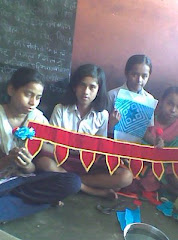The issue of censorship, or how some elements in our
 midst have a say over what the rest of us do, is troubling. We need to examine our response to such elements who decide what we should do, how we should think, and how we should project ourselves. I wrote the article on Deepa Mehta's film some years ago. What happened to the film, the protests that it faced fall into the category that I term 'rowdy censorship', where a few loudmouths scream and shout, and even vandalise, forcing the artist to move away from the locale or hide his or her work. The photo you see here is a still from the film Water showing Chuhiya, the child widow with an older one.
midst have a say over what the rest of us do, is troubling. We need to examine our response to such elements who decide what we should do, how we should think, and how we should project ourselves. I wrote the article on Deepa Mehta's film some years ago. What happened to the film, the protests that it faced fall into the category that I term 'rowdy censorship', where a few loudmouths scream and shout, and even vandalise, forcing the artist to move away from the locale or hide his or her work. The photo you see here is a still from the film Water showing Chuhiya, the child widow with an older one.The article first appeared on Voices-Unabridged - The E-Magazine on Women and Human Rights Worldwide.
"Water" the Forbidden Movie
by Shree Venkatram, 10/08/06
Deepa Mehta’s film, “Water”, has been drawing crowds ever since its world premiere four months ago. It ran full house in Australia and has become the highest-grossing Hindi language film in North America for 2006. But in the country of its origin, India, it has yet to be released.
Set in the 1930s, “Water” tells the story of upper caste Hindu widows in Varanasi. Seventy-five years later, young and old women still sit in the ‘widow houses’ of the holy city, packed off there by relatives who either found it too burdensome to look after them or wanted to grab their property. Poorly educated and often illiterate, these women live a life of penury with barely a sari to cover them and hardly enough food to see them through the day. Although separated by three fourths of a century, both sets of women are prone to sexual abuse and exploitation.
Though not on reel, “Water” tells another story about politics and perceived ‘national honour’. It is a contemporary story of how a small vocal group, playing the role of moral police, curtails free expression.
Deepa Mehta, the Indian-born Canadian filmmaker, had the necessary license from the Ministry of Information and Broadcasting to shoot the film on the Varanasi ghats in the state of Uttar Pradesh in 2000. Unfortunately, in a country that values democracy, stands by free speech and prides itself for its tolerance, the government issued license could not ensure the filming. The will of the cacophonous group prevailed. It burnt the main set of the film and threw it into the river. It shouted slogans demanding that the film troupe leave and burnt effigies of Deepa Mehta. Its statement to the press said, “They come with foreign money to make a film which shows India in poor light because that is what sells in the West. The West refuses to acknowledge our achievements in any sphere, but is only interested in our snake charmers and child brides. And people like Deepa Mehta pander to them."
Deepa dashed to Delhi, met with the minister, cleared the script again, and armed with an order that filming be allowed, returned to film. Under heavy police protection, the filming began. But after a couple of takes, the local authorities arrived on the sets, reporting that since they could not guarantee the troupe’s safety, they would have to leave.
It would be four years before Deepa would resume work on “Water” again, this time in the neighboring island country of Sri Lanka with sets made to resemble the ghats of Varanasi. The change of locale did not alter the story in any way, except for some details. In one sequence, for example, the people who go past the widows outside a temple look Sinhalese.
The protest about “Water” had a precursor. Deepa’s earlier film, "Fire", which dealt with lesbian love between two sisters-in-law, saw protests after three weeks of a successful run in cinema houses of Delhi and Mumbai. This was when a group decided that the film was “contrary to Hindu values, anti-Indian, corrupting of morals.” Cinema houses screening it were stoned and there were protest marches forcing the government to ban the film. Ironically, most of those who were protesting against “Water” had not read the script. Just as most of those who shouted slogans against “Fire” had not seen the film. Deepa Mehta said in an interview that she had come across people in Varanasi who had rewritten leaked pages of the script.
"Water" shows widows shorn of their femininity (tonsured and dressed in a shroud of white), being pushed to the fringes of society and made to beg for a living. Even the child widow, Chuhiya, has to follow the strict dress and behavior code. She is reprimanded for looking longingly at goodies in a sweetmeat shop, food a “woman” can’t enjoy after the death of her husband. Though society barely acknowledges their presence, it is not averse to exploiting and sexually abusing them.
The moral keepers of the 1930s had no qualms about the subjugation and sexual exploitation of the widows. The moral police of today gets offended because the film shows the country in a bad light, even though it has never raised its voice over the exploitation and the degradation of these widows.
Although the film has a tragic ending, the spirit in which it ends is uplifting. It is about winning when the odds are stacked against you. In a way, this is Deepa’s story—of how even with her sets burnt, her funds run out, her initial team of lead actors not able to give her new dates, she picked up the pieces to complete the task she had embarked upon. “Water” is a story of determination, of the indefatigable human spirit.
The link to the article on Voices Unabridged http://voices-unabridged.net/article.php?id_article=151&numero=10
More links to posts on Rowdy Censorship
Extremists frigthen us into silence
.jpg)





+(2).jpg)


2 comments:
this photo really touched me. where did u shot them ?
It is from the promotion material of the film. I found it on the net.
Post a Comment